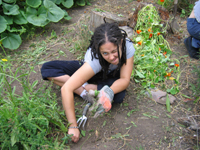You think about a lot of things while mopping the dining room floor at midnight. Here’s the scene: it’s my first semester living at the Oscar Wilde House, a queer themed student co-op and part of Berkeley’s University Students Cooperative Association (USCA). It’s also my first semester studying nonviolence through the Peace and Conflict Studies department. Leaning over our 6-gallon industrial mop bucket, I brush sweaty hair off my face and think, "So this is what Gandhi meant by the dignity of labor."
As unglamorous as this sounds, it’s actually the coalescence of a lot of exciting new ideas in my life. In class I was learning about Gandhi’s ashrams (cooperative farms and centers for spiritual practice) and the role they played in the South African and Indian freedom movements: at home I was seeing cooperativity put into practice. Now, three years later, I still live in a co-op, and I still consider myself a student of nonviolence. And I’ve kept right on thinking about how the USCA is keeping certain Gandhian principles alive in 2006, and how the co-ops are part of the same struggle to create a freer and more humane world.
Gandhi’s ashrams were operated in an egalitarian fashion, and everyone was required to contribute their “bread labor.” Gandhi believed strongly that meaningful hands-on work carries great dignity and is essential for a person’s physical and spiritual wellbeing. In the co-ops, everyone contributes five hours of workshifts per week, meaning that together we not only own our own houses but run them and keep them clean. Although there is nothing fun about cleaning toilets, it has more meaning when it’s your toilet – and when you know you’re not relying on underpaid workers who are marginalized in our society to come in and do it for you.
Indeed, Gandhi saw egalitarian, cooperative, “do it yourself” labor as not only a vehicle for personal growth, but also a means of promoting economic and ecological sanity. In colonized India it was very important for Indian people to be self-reliant in order to protect their local economies, since economic dependence is one of the backbones of imperial rule.
Like Gandhi’s ashrams, the co-ops practice some level of “swadeshi,” or local self-reliance, so as not to participate in a labor market that exploits people, as well as to keep our own rents down. A group called the Barrington Collective, largely composed of co-opers interested in anarchist philosophy and organization, takes this ethos a step further with its semesterly “Do It Yourself” festival, in which people can learn how to make their own things in order to be less dependent on corporations. The co-ops also practice conscious consumerism through buying in bulk, sharing furniture and appliances, composting, and training recycling managers to dramatically reduce house-level waste.
Another Gandhian principle embodied by the co-ops is that of “swaraj,” or self rule. Gandhi believed that India would never be free until Indian people demonstrated that they could rule themselves, individually and collectively. In the United States, where direct democracy is secondary to representative democracy and the political system limits most people’s role to that of consumer, the co-ops offer a unique opportunity to practice the democratic process on a house and central level. Each co-op makes decisions about policy and spending collectively through weekly house meetings, and the entire non-profit organization of the USCA is run by an elected student board of directors. Each co-op also elects in-house managers, who get hands-on leadership experience. This aspect of co-op life has been empowering for me and prepared me to participate in larger opportunities for self-governance in this society, such as non-profit organizations, social movements, and community organizing. Living in an alternative institution also offers students rich opportunities (often late at night) to ponder and discuss questions of political philosophy and social organization—another preparation for citizenship and social change.
Like Gandhi’s ashrams, the USCA is very much involved in society at large. The co-ops have been an effective platform for dialogue about housing and higher education issues, as well as for political organizing—demonstrated by the web of co-op based affinity groups that committed civil disobedience in San Francisco the day after the Iraq War started. Similarly, the Oscar Wilde LGBT-themed house offers a safe place for lesbian, gay, bisexual, and transgender youth to socialize, and the African-American theme house has a community service requirement for its members. A number of USCA co-opers have gone on to establish their own co-ops after graduation, thereby contributing to the broader movement of cooperative living and cooperative, worker-owned businesses.
Since the Great Depression, when students founded the USCA to create affordable housing for themselves and their peers, the USCA’s mission has been about creating a progressive alternative within society. This is an example of Gandhian “constructive program” (complimenting “obstructive program,” or getting in the way of injustice). The USCA’s mission is ever more crucial today, when high rents prohibit many low-income and minority students from accessing a university education. In a less formal way, many of the co-op houses embody another vision of how people should live together—taking in visitors, sharing our plenty, offering our space to grassroots groups like Food Not Bombs, which salvages food and cooks healthy, vegan meals to share with hungry people.
The most important aspect of co-op life, in my opinion, is the fact that co-ops offer community and a place to live that is human-scale and less bureaucratic that university housing. Many students experience college life as alienating, though they might not use that word. Co-ops offer an intimate community where affection and a sense of place can replace that alienation. They also offer opportunities to learn and practice conflict resolution, which is an essential skill in our increasingly interdependent world. Living in close proximity to so many other people, co-opers have the chance to practice the Gandhian ideal of heart unity, which means the recognition of a larger unity in diversity. It’s important for co-opers to remember this ideal when we feel tempted to scorn the Greek system. Instead of seeing fraternities as totally alien institutions, we can see them as another kind of collective housing that meets people’s human need for community, albeit with a different culture and structure.
Despite all the ways in which co-ops embody Gandhian ideals, there are important differences. Co-ops are not spiritual communities (although some co-opers are starting an Interfaith co-op outside the USCA), there are no families, and we don’t grow much of our own food. It’s hard to draw parallels between our raucous parties and Gandhi’s communities, which required a vow of chastity of all members! But there are some important lessons to be drawn from this comparison.
Most significant is the insight that co-ops are part of a movement to revitalize society, well underway in Gandhi’s time. Gandhi was against top-down, capitalistic globalism and imperialism. Many progressive students worry about these phenomena, now much further developed today: economic globalization, commercialism, and the alienation of mass society. Like the ashrams, co-ops provide an alternative as well as demonstrate what’s possible when we seek to enact our principles in our daily lives. Gandhi once said, “You must be the change you wish to see in the world”—maybe I’ll write that on the milk machine for the next sweaty workshifter.
NASCO: www.nasco.org
USCA: www.usca.org
Cooperative Roots: www.cooperativeroots.org
Vows and Observances by Mahatma Gandhi: Teachings on the practice of daily living, available through Berkeley Hills Books


